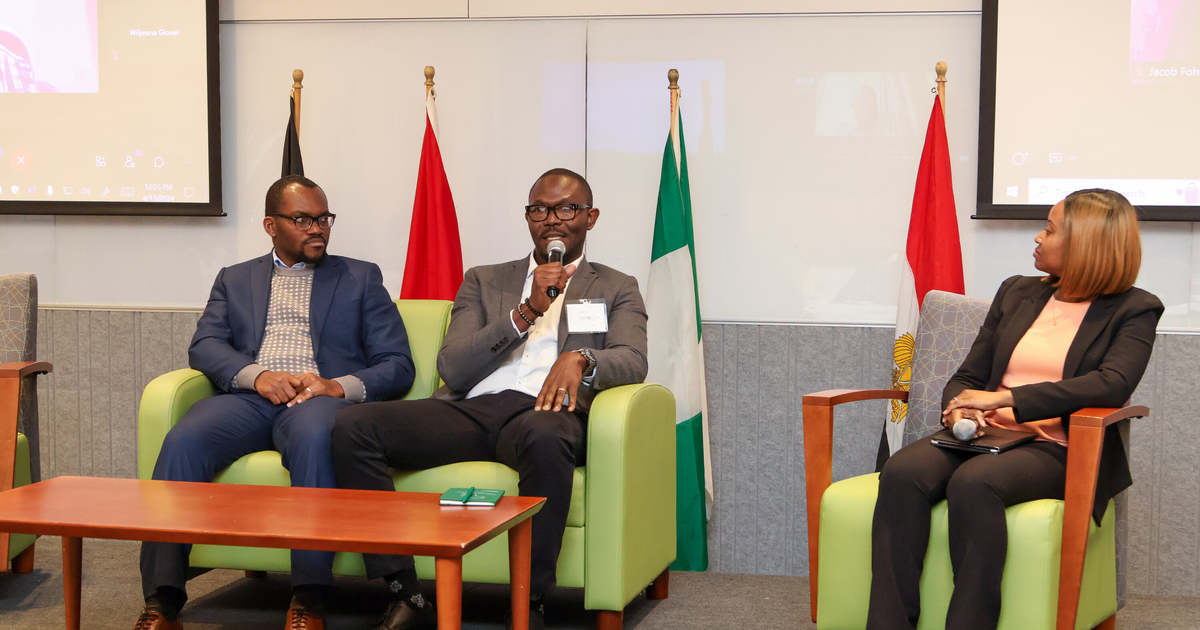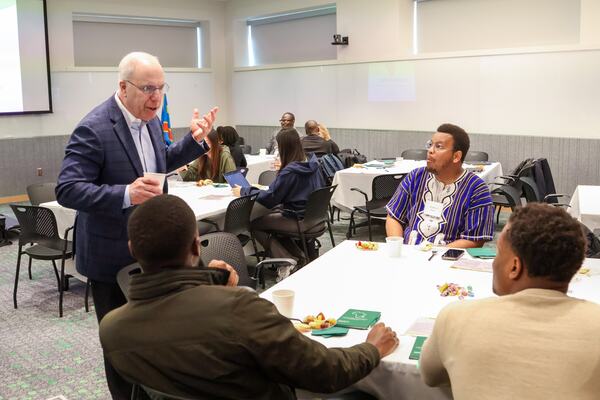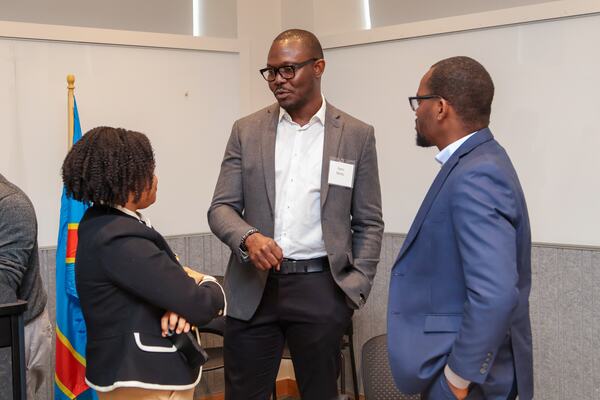Babson Alumni Bridge the Gap for African Entrepreneurs

It’s the kind of bold, audacious promise that demands attention: a vow to fund 5,000 African-founded startups by 2030.
But, Femi Moito MBA’20 and Jacob Fohtung MBA’19, MSF’20 believe the ongoing divide between the fast-growing number of new businesses across the African continent and deep-pocketed investors make it necessary to embark on this ambitions mission.
“The biggest bridge that has to be built is access,” Moito asserts. “We need to connect people and resources, especially for founders of color who often face barriers in accessing funding.”
Their endeavor, named Innovest Afrika, works with 10 to 12 pre-screened venture founders on a six- to eight-week accelerator program. The founders learn how to market their product, refine their business models and potentially scale their startups for high growth. The program provides founders with mentors and coaching opportunities, then they compete in a pitch competition, called Demo Day, where the winner can receive up to $20,000.
While the partners plan to work with African-founded businesses worldwide, their connection to Babson remains strong. Moito and Fohtung participated last month in a panel discussion at the first Babson Africa Conference. They connected with other founders as well as Babson President Stephen Spinelli Jr. MBA’92, PhD at the event, titled Fostering Entrepreneurship Across Africa and Beyond.
“We wanted to show that Babson is still number one in entrepreneurship, and we’re bringing that spirit to African innovation,” Fohtung asserts.
A Babson Beginning
The genesis of this ambitious project can be traced back to Moito and Fohtung’s time at Babson College, where their paths first crossed. Moito recalls, “I met Jacob at Babson. Everybody knew him. He was very passionate about Africa.”
Moito had moved to the United States later in life, bringing with him a wealth of experience from the telecom and fintech sectors. His career trajectory shifted from working with early-stage companies in Nigeria to, at one point, working in venture capital. It was his experience in venture capital that laid some of the groundwork for his vision of Innovest Afrika.

“I was the only Black person in the company, and during that time we saw an increase in applications from founders of color by over 70 percent,” Moito said. “The only reason we could think of was because they could relate to somebody in the organization.”
Despite the increase in applications, people of color didn’t seem to receive funding.
“It’s not that there was a deliberate plan to exclude founders of color,” Moito said. “Often, it’s just a disconnect. We don’t seem to speak the same language. We need more bridges to understand each other’s points of view.”
Enter Fohtung, whom Moito recalled as a passionate advocate for African innovation. Their mutual interests and complementary skills made them natural partners.
“When Femi reached out, I was in Bangkok, spending time in Vietnam, meeting Africans with big dreams,” Fohtung recalls. “Femi’s vision was compelling. It wasn’t just about Africa as a continent but about Africans as a people, no matter where they are in the world.”
All of Africa
The need for connection isn’t limited to skin color, said Fohtung.

“It’s a huge continent, and we’re all the same color but that’s about it,” Moito said. “We speak different languages, we eat different food, we have different religions.”
That’s why Innovest Afrika is so focused on building bridges between cultures, markets, and ideas. “We need more bridges to understand each other’s points of view,” Moito said.
Fohtung echoes this sentiment, emphasizing the importance of partnerships in their strategy. “In West Africa, we’re bullish on partnerships. They help us understand local markets and connect with the right people on the ground.”
Benefits of Babson
Moito and Fohtung credit Babson College for providing the foundation for their entrepreneurial journey. “Babson gave us the introduction and most importantly, the foundation of how we think about entrepreneurship,” Fohtung says.
The College’s global outlook and strong network have been instrumental in their success. “We represent Babson not just as an institution but as a global organization,” Moito adds. “What are the odds that two Babson grads from different countries would come together to build something this impactful?”
Looking Ahead
As Innovest Afrika moves forward, its creators remain committed to their vision of generating a robust ecosystem for African-founded startups.
“We’re accelerating startups, but we’re also a startup,” Femi says with a smile. “Everyone wears multiple hats. Fohtung is my sparring partner—we brainstorm, challenge each other, and refine our ideas together.”
“The biggest bridge that has to be built is access. We need to connect people and resources, especially for founders of color who often face barriers in accessing funding.”
Femi Moito MBA’20, co-founder of Innovest Afrika
The duo plan to host accelerator cohorts worldwide, in cities such as Nairobi, Atlanta, and Houston, in their bid to connect much-needed capital and support to entrepreneurs of African descent, wherever they may be in the world.
Their journey is just beginning, but the impact they’re already making is profound. From Lagos to Detroit, Innovest Afrika is poised to shape the future of African entrepreneurship, one startup at a time.




